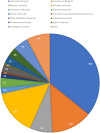Impact of the COVID-19 pandemic on medical education: Medical students' knowledge, attitudes, and practices regarding electronic learning
- PMID: 33237962
- PMCID: PMC7688124
- DOI: 10.1371/journal.pone.0242905
Impact of the COVID-19 pandemic on medical education: Medical students' knowledge, attitudes, and practices regarding electronic learning
Abstract
The Coronavirus Disease 2019 (COVID-19) pandemic has caused an unprecedented disruption in medical education and healthcare systems worldwide. The disease can cause life-threatening conditions and it presents challenges for medical education, as instructors must deliver lectures safely, while ensuring the integrity and continuity of the medical education process. It is therefore important to assess the usability of online learning methods, and to determine their feasibility and adequacy for medical students. We aimed to provide an overview of the situation experienced by medical students during the COVID-19 pandemic, and to determine the knowledge, attitudes, and practices of medical students regarding electronic medical education. A cross-sectional survey was conducted with medical students from more than 13 medical schools in Libya. A paper-based and online survey was conducted using email and social media. The survey requested demographic and socioeconomic information, as well as information related to medical online learning and electronic devices; medical education status during the COVID-19 pandemic; mental health assessments; and e-learning knowledge, attitudes, and practices. A total of 3,348 valid questionnaires were retrieved. Most respondents (64.7%) disagreed that e-learning could be implemented easily in Libya. While 54.1% of the respondents agreed that interactive discussion is achievable by means of e-learning. However, only 21.1% agreed that e-learning could be used for clinical aspects, as compared with 54.8% who disagreed with this statement and 24% who were neutral. Only 27.7% of the respondents had participated in online medical educational programs during the COVID-19 pandemic, while 65% reported using the internet for participating in study groups and discussions. There is no vaccine for COVID-19 yet. As such, the pandemic will undeniably continue to disrupt medical education and training. As we face the prospect of a second wave of virus transmission, we must take certain measures and make changes to minimize the effects of the COVID-19 outbreak on medical education and on the progression of training. The time for change is now, and there should be support and enthusiasm for providing valid solutions to reduce this disruption, such as online training and virtual clinical experience. These measures could then be followed by hands-on experience that is provided in a safe environment.
Conflict of interest statement
The authors have declared that no competing interests exist.
Figures
References
-
- Organization WH. WHO Director-General’s opening remarks at the media briefing on COVID-19–11 March 2020. https://wwwwhoint/dg/speeches/detail/who-director-general-s-opening-rema.... 2020.
-
- Organization WH. WHO Director-General’s opening remarks at the media briefing on COVID-19–3 April 2020. https://wwwwhoint/dg/speeches/detail/who-director-general-s-opening-rema.... 2020.
MeSH terms
LinkOut - more resources
Full Text Sources
Medical
Research Materials


